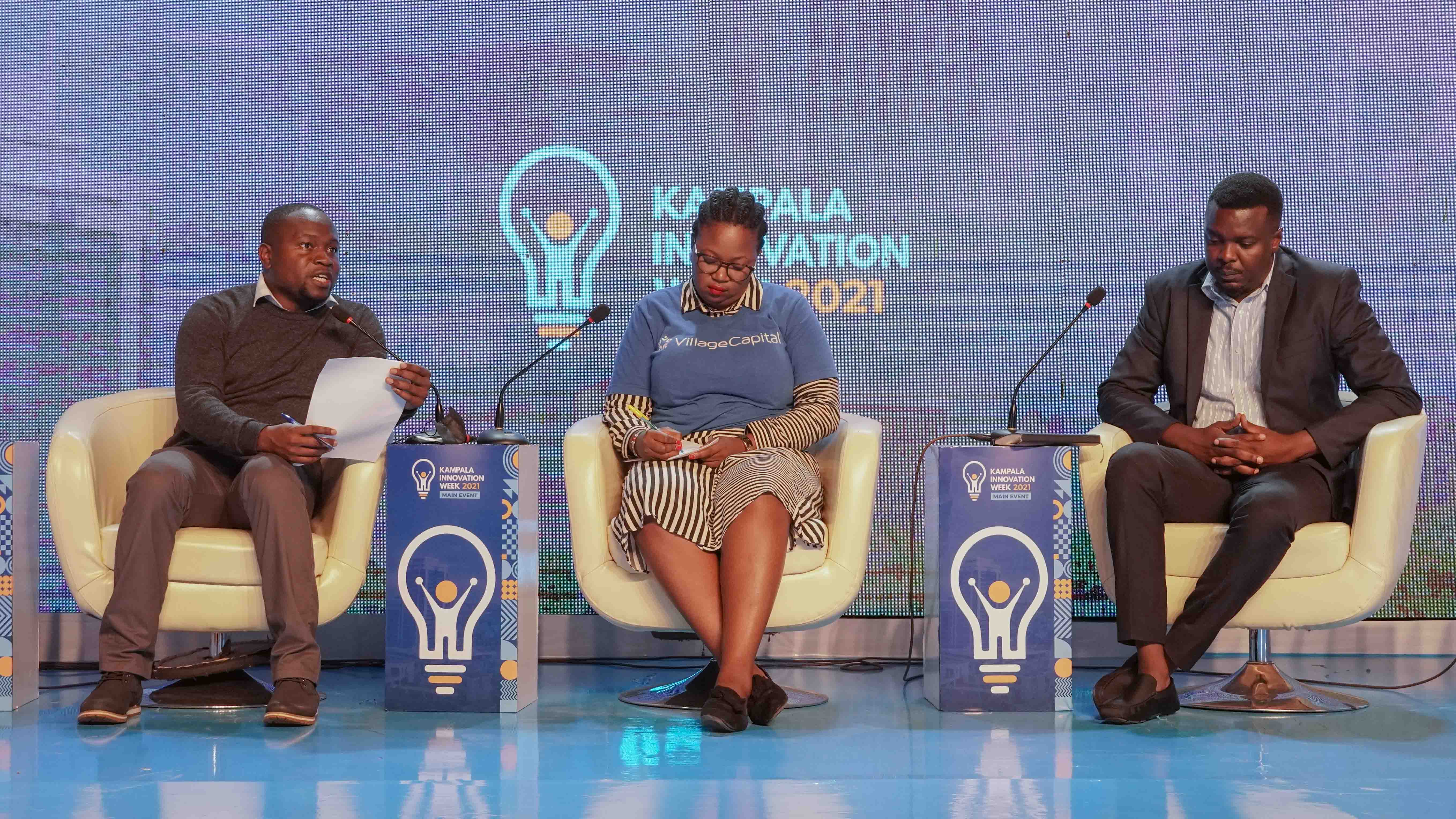
At the just concluded Kampala Innovation Week, Outbox hosted a session in conversation with Village Capital and Uganda Entrepreneurial Ecosystem Initiative (UEEI) on creating an enabling environment for innovation and entrepreneurship. Despite the fact that we realize the value and purpose of being very innovative in terms of driving economic growth in Uganda, It is important that we deliberately find ways of synergizing and fostering these efforts.
With focus on the context within which the startup ecosystem in Uganda and how intermediaries contribute to it, this conversation focused on challenges Uganda still grapples with, and the best practices we can adopt.
Brenda Wangari, a senior program manger for Africa at Village Capital, who works on the emerging markets practice to catalyze early stage deal flow by supporting supporters of entrepreneurs solving real world problems brought regional experience, while Ham Namakajjo, a director at UEEI, shared interventions that work when different actors are involved in the realization of an enabling environment.
How can startups benefit from Intermediaries or Entrepreneurship Support Organizations (ESOs)?
Brenda: Intermediaries are entrepreneurship support organizations that support entrepreneurs to achieve their goals. On a positive note, a lot of people running these intermediaries are people with great experience, interacting and learning from what they are doing. They have gathered experience in building impactful and profitable businesses and are best suited to guide young entrepreneurs achieve as well.
However on the flip side, most intermediaries are startups themselves which restricts funding, as they only get funding to run programs and not to invest in internal investments which then improve sustainability.They then face problems like a loss of high potential employees to their competitors because they are unable to pay them.
My suggestion to this is that funders need to understand that while they must support entrepreneurs, the Entrepreneurship Support Organizations (ESOs) must also make an internal investment, and must therefore avail grant capital to run the accelerator and capital for internal investments for the intermediary.
What do you appreciate about Uganda’s ecosystem and how can we solve the challenges we grapple with?
Brenda: Uganda’s startup ecosystem is no different from any other ecosystem out there. The Kenyan ecosystem was once at this place. The same can be said about Nigeria too. However for those that are not familiar with Village Capital, we are the world’s most active supporter of seed stage entrepreneurs, 12 years globally and celebrating 10 years in Africa.
We run sector-specific capacity accelerators for entrepreneurs but also do capacity building for other entrepreneur support organizations which is the work we are doing in Uganda. We run the Uganda Ecosystem Builders Program where we trained 13 ESOs, through a business diagnostic activity where they viewed their organizations as funders would, they were able to identify gaps and create milestone plans.
How can we strengthen the Ugandan Startup Ecosystem?
Ham: An ecosystem means that there are various components that feed off each other. An entrepreneurial ecosystem has various actors that support entrepreneurs e.g. government, academia, incubators, funders, ESOs, .The interaction of these different actors is important to achieve impact. Fixing our weaknesses as players in the ecosystem while interacting and feeding off each other's strengths.
UEEI made a diagnostic where we established certain factors that are binding constraints for a business to thrive for example, a lack of financing for medium growth, lack of investment growth for ambitious businesses, viscous cycles of informality that businesses have including poor record keeping, tax avoidance, weakness in our management practices, no role models to learn from or case studies of scale.
providing support services is not commercially viable to provide early stage startups.
We decided to get all the stakeholders and find out what the most pressing needs of the ecosystem are, define the priorities, go through the process of ideation around intervention and collectively implement the ideas or look for catalytic funding for those interventions but more importantly learn from them.
The Startup ecosystem is a continuous learning experience. We can never get to the top of it. We can never get to a place where it is fully strengthened.
I am happy to reveal that we are opening up learning labs where we are going to interrogate evidence based research conversations and open up action labs where we ideate and formulate said interventions.
How can we standardize Business Development Support (BDS) Services?
It is critical that Business Development Support services are accessible.The aspect of specialized services like management of records and talent is still lacking as most businesses are young and are trying to generate revenue. It is always that they cannot afford specialized services around different aspects of their businesses are also not aware of the need to standardize.
Brenda: Usually hubs provide BDS services however my advise is that you really need to be specific about the entrepreneur that you support. The challenge is that there is always a mismatch between the intermediary and the entrepreneur they are supporting. Sometimes hubs support High-growth ventures when they should be supporting livelihood enterprises and vice versa.
It is very key for a hub to be sure about what entrepreneur they are supporting because then the support is relevant. Hubs can do this by running sector-specific cohort programs because they meet the problems of the entrepreneurs that sign up for them ~ Brenda Wangari
Have you seen any good stories or case studies around entrepreneurs that have built successful BDS services and are earning from it?
Brenda: A lot of BDS organizations across the continent do not charge for their programs or support offered. A lot of it is grant funded where the organization doesn’t earn anything from it. However even though it is a fairly new concept for organizations to charge for their programs, entrepreneurs that pay for these programs are usually seeking the support that the programs offers.
Entrepreneurs need to understand that there are things you won’t get for free, you must pay. While hubs should consider using some of the grants given to them to pilot paying programs for their customers.
The demonstration of value of a small and growing business is when it gets its client to pay for a program. - Richard Zulu
Binding constraints of finance. How can we address these?
Most traditional financing instruments are not suitable to businesses. Aside from restricting funding, most partners don’t want to walk with intermediaries in experimenting with new models of funding. How can we drive more investment in the capabilities of the ecosystem builders, how can we have affordable and accessible financing?
Ham: There are many funding interventions going on, what we lack is a coordination of all these efforts. For example there are guarantee funds going out to the agricultural sector which dictate to banks how to invest in startups. Such Funds must be broadened to include other sectors and entrepreneurs.
It is also no secret that borrowing is super high and what drives this up is government’s appetite to borrow. The competition between private borrowing and government borrowing is also a serious problem. There needs to be a conversation with government such that their policies and practices do not create weird incentives in the market for example double taxation of capital gains for high growth businesses.
Working with government to understand the implications of some of their policies and working with them figure out how to turn them around will open up great opportunities for the startup space ~ Ham Namakajjo
There are already efforts for example the East African Venture capital Association and Capital Markets Authority are working on regulations to amend
We must have a harmonized way to approach these interventions, and mustn’t work in silos because we all have a mandate to create an enabling environment.
How do we catalyze demand and remove the obstacles of demand driven approaches?
Ham: Firstly, we must engage with and design interventions that are relevant to the people we are designing them for. The previous way of designing solutions for any gaps included doing an analysis, finding the gaps, design and roll out interventions. That made the interventions less impactful. We therefore need to do a bottoms-up approach involving all partners including development partners, government, private and public partners and entrepreneurs.
What are some of the innovative models that you've seen working in different ecosystems to unlock early stage funding for enterprises?
Brenda: Money is always there. There is so much later-stage capital while the risk is with early stage startups who need de-risking. Hubs run programs that culminate in pitching events as a way to de-risk startups.
A lot of the entrepreneurs that have gotten funding didn’t meet their funder at a pitching event. They made a connection either through one-on –one conversations, cold emailing or follow-ups. Conversations are where the magic lies because that way, the funder and entrepreneur is able to decide who the best fit would be.
In as much as funders do due diligence on startups, startups need to also do due diligence on investors ~ Brenda Wangari
Furthermore, it is the responsibility of the hubs to educate the entrepreneurs about the different investments available which might include Safe notes, revenue share, loan, equity etc
Ham: We need to collectively figure out how startups operating informally can become investment-ready. By creating a facility that avails one-on-one consulting on how to formalize a business, we are helping these small businesses solve problems, formalize their businesses and position themselves. This is building a pipeline of businesses for investors, while hand-holding entrepreneurs to a point where they are trained for a particular period of time.
What does the Ugandan startup ecosystem have to do for a powerful value preposition?
Brenda: The Ugandan ecosystem is on the right path. Some countries may have made great strides, but there is progress in Uganda that is worth celebrating for example Chipper cash $2B valuation, Ugabus acquisition by Nigeria's Treepz. What needs to happen from her is specialization in-terms of sector specific programs or sector specific funding so that different hubs don't feel like they are competing with each other.
Most hubs have not thought of specializing, and as such think of themselves as competition. There are conversations that need to happen if the Ugandan ecosystem is working towards groundbreaking success for its players.
Closing remarks
Ham: My key themes from this conversation are Participation and harmonizing our efforts. Entrepreneurs have to be at the center of the ecosystem especially in leadership roles. Be involved, be part of the solution we are trying to drive. Times are moving very fast, you either float or sink.
Brenda: There's a famous quote that says "The more successful ecosystems are not the dense ecosystems, but connected ecosystems". Are there ways startup ecosystem players can collaborate more? If yes, then we will have unlocked a new level of success.
Thank you. You can watch the conversation here #KIW2021

